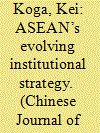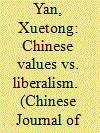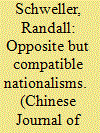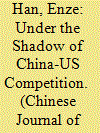|
|
|
Sort Order |
|
|
|
Items / Page
|
|
|
|
|
|
|
| Srl | Item |
| 1 |
ID:
158258


|
|
|
|
|
| Summary/Abstract |
This article argues that a change in institutional strategy enables The Association of Southeast Asian Nations (ASEAN) to manage its great power relations and prevent their abrupt political intrusion into the region by providing the policy options of pursuing institutional balancing, bandwagoning, hedging, or co-option. ASEAN’s strategy is not only to choose optimal policy under a changing security environment, but also to create an institutional division of labour by proliferating ASEAN-led institutions to ensure, as far as possible, regional autonomy and Member States’ security. Changes in ASEAN’s institutional strategy occur when its Member States expect a change in the regional distribution of power. However, due to constraints created by the existing institutional design it is difficult to make any drastic alteration to the institutional strategy unless a radical change in the regional power configuration occurs. This article examines the cases of East Asia Summit and ASEAN Defence Ministers Meeting (ADMM)/ADMM-Plus during the period 2005–2016, the comparison of which illuminates the causes and processes of their strategy change and helps to deepen our understanding of the roles of regional security institutions.
|
|
|
|
|
|
|
|
|
|
|
|
|
|
|
|
| 2 |
ID:
158256


|
|
|
|
|
| Summary/Abstract |
The liberal hegemony of the United States is fading and faces the growing challenges from other ideologies including those from China. The question is which Chinese political values will guide China’s policies in shaping the future international normative order. There are three political values compete with each other in China, Marxism, economic pragmatism, and Chinese traditional values. The Chinese government tries to combine Marxism with Chinese traditional values. Such effort, however, may find its difficulties in achieving the assigned targets. Although the US liberalism is losing influence, it is still the most influential global ideology and will not be abandoned overnight. China may find that it is possible to shape the international order by combining some Chinese traditional values with selected liberalist values, such as benevolence, righteousness and rites with equality, democracy and freedom, respectively. The combination can produce a set of modern values of wangdao (humane authority), such as fairness, justice, and civility. The new norms under the guidance of these values could be acceptable to most countries because of their universality, and will bring about a more peaceful international order than what we have today.
|
|
|
|
|
|
|
|
|
|
|
|
|
|
|
|
| 3 |
ID:
158257


|
|
|
|
|
| Summary/Abstract |
China’s new assertiveness and the sudden inward turn of United States are a function of causes located in both the second and third images. The key second-image variable is nationalism, which combines with the power trajectories (a third-image variable) of both China and the United States to define how their relationship will unfold in the coming years. The interaction between nationalism and power trajectory produces entirely different foreign policy orientations in rising and declining powers—the former embraces an outward-looking, extroverted foreign policy of expansion, while the latter adopts an inward-looking, introverted foreign policy of restraint and retrenchment. The resurgent nationalisms of the rising challenger and the declining hegemon are entirely compatible with a future relationship characterized by peace and harmony. Obviously, the two nationalisms pose no inherent conflict of interests: China currently wants more global influence; the Unites States wants less. Hence, there is good reason to expect a soft landing as the world moves from unipolarity to bipolarity.
|
|
|
|
|
|
|
|
|
|
|
|
|
|
|
|
| 4 |
ID:
158259


|
|
|
|
|
| Summary/Abstract |
With the U.S. and China competing for influence in Southeast Asia, how secondary states in the region make their foreign policy choices has come under more scrutiny. It seems secondary states in the region have exerted strong will and capacity to maintain significant amount of freedom in choosing their foreign policy orientations, rather than being totally dictated by the great powers. This paper presents a detailed paired comparison of Myanmar and Thailand’s alignment policies and their consequences since the end of World War II. The paper argues that international structural factors certainly constrain the options for secondary states, but domestic politics often play a significant role in how political leaders make the alignment choices they do, which is heavily conditioned by how these leaders derive their political legitimacy. Thus, to explain the alignment choices of secondary states in Southeast Asia, we need to pay more attention to the intertwined nature between domestic political contestation and foreign policy making.
|
|
|
|
|
|
|
|
|
|
|
|
|
|
|
|
|
|
|
|
|